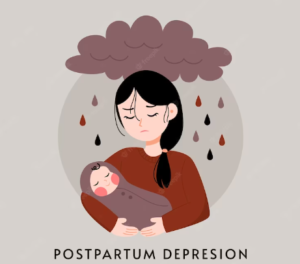Bringing a new life into the world can be a joyous and transformative experience, but it can also come with its own set of challenges, particularly for new mothers. Postpartum depression, a condition that affects many women after childbirth, can be a daunting and isolating experience. However, there is hope and help available. In this article, we will explore the world of postpartum psychiatrists, their crucial role in supporting mothers, and how you can find a postpartum psychiatrist near you.
Contents
Understanding Postpartum Depression

Postpartum depression is a form of clinical depression that occurs after childbirth. It is characterized by persistent feelings of sadness, hopelessness, and fatigue, often accompanied by changes in sleep and appetite.
Postpartum depression is more common than many people realize, affecting approximately 1 in 7 women. Recognizing its prevalence is essential to seeking help when needed.
Several factors can increase the risk of developing postpartum depression, including a history of depression, hormonal changes, and a lack of support.
Introduction to Postpartum Psychiatrists
Postpartum psychiatrists are medical professionals who specialize in the diagnosis, treatment, and management of mental health disorders that occur during the postpartum period, which is the time immediately following childbirth.
This field of psychiatry focuses on addressing the unique emotional and psychological challenges that women may face during this critical phase of their lives. Here’s an introduction to postpartum psychiatrists and their role in supporting maternal mental health:
- Scope of Practice: Postpartum psychiatrists are trained to work with women who experience a wide range of mental health issues during the postpartum period, which typically encompasses the first year after childbirth. This includes conditions such as postpartum depression, postpartum anxiety, postpartum psychosis, and other mood and anxiety disorders.
Role of a Postpartum Psychiatrist

The role of a postpartum psychiatrist is multifaceted and crucial in addressing the mental health needs of individuals during the postpartum period, which typically extends to the first year after childbirth. These psychiatrists are specialized in diagnosing, treating, and managing mental health conditions that can arise during this phase. Here’s an overview of their role:
- Diagnosis and Assessment: Postpartum psychiatrists are responsible for conducting comprehensive assessments to diagnose mental health disorders in postpartum individuals. This involves evaluating the individual’s symptoms, medical history, and any specific challenges or stressors related to childbirth and motherhood.
- Treatment Planning: They develop tailored treatment plans based on the specific needs and circumstances of each patient. Treatment options may include psychotherapy (individual or group therapy), medication management, lifestyle modifications, and alternative therapies.
- Education and Support: They play a vital role in educating patients and their families about postpartum mental health conditions, their course, and available treatment options. They provide guidance on coping strategies and self-care practices.
- Collaboration with Healthcare Providers: Collaboration with other healthcare professionals is essential. Postpartum psychiatrists work closely with obstetricians, pediatricians, primary care physicians, and other specialists to ensure holistic care for both the mother and the baby. This collaborative approach helps address physical and mental health issues comprehensively.
- Screening and Prevention: In some healthcare settings, postpartum psychiatrists may be involved in implementing screening programs to identify at-risk individuals early on. This can help in the prevention and early intervention of postpartum mental health disorders.
- Advocacy and Research: Some postpartum psychiatrists engage in research to advance our understanding of perinatal mental health and contribute to evidence-based practices. They may also advocate for policies and initiatives that promote better mental health care for postpartum individuals.
Finding a Postpartum Psychiatrist Near You
Finding a postpartum psychiatrist near you involves several steps to locate a qualified mental health professional who specializes in postpartum mental health. Here’s a guide on how to find a postpartum psychiatrist in your area:
- Consult Your Healthcare Provider: Start by talking to your obstetrician, gynecologist, or primary care physician. They may have referrals or recommendations for postpartum psychiatrists in your local area. Healthcare providers often have a network of specialists they can refer you to.
- Health Insurance Provider: Contact your health insurance provider or visit their website to search for mental health professionals in your network. They usually have directories or search tools that allow you to find psychiatrists by specialty, location, and other criteria. This can help you identify psychiatrists who accept your insurance.
- Online Directories: Use online directories that specialize in listing mental health professionals. Find a Psychiatrist tool allows you to search for psychiatrists by location and specialty. You can filter your search to find postpartum psychiatrists.
- Referrals from Support Groups: Postpartum support groups, whether in-person or online, can be valuable resources. Members of these groups may have recommendations or personal experiences with postpartum psychiatrists in your area. Consider joining local postpartum support groups or online communities for guidance.
- Local Hospitals and Clinics: Contact local hospitals, medical clinics, or mental health centers. These institutions often have psychiatrists on staff or can provide referrals to specialists in postpartum mental health.
- Ask for Recommendations: Seek recommendations from friends, family members, or colleagues who have had experiences with postpartum mental health professionals. Personal referrals can be valuable in finding a trusted psychiatrist.
- Online Reviews and Ratings: Read online reviews and ratings for psychiatrists in your area. Websites like Yelp, Google Reviews, or Healthgrades may have patient feedback and ratings that can help you make an informed decision.
- Contact Multiple Psychiatrists: Once you’ve identified potential postpartum psychiatrists, reach out to them to inquire about their services, availability, and experience with postpartum mental health. You can schedule initial consultations to discuss your needs and assess your comfort level with the psychiatrist.
How to Prepare for Your First Visit?

Preparing for your first visit to a postpartum psychiatrist is an important step in ensuring that you have a productive and successful experience. Here are some tips on how to prepare for your initial appointment:
Gather Necessary Information:
- Make a list of any current medications you are taking, including dosage and frequency.
- Compile your medical and mental health history, including any previous diagnoses, treatments, and hospitalizations.
- Note any specific symptoms or concerns you are experiencing related to your mental health or postpartum period.
Complete Necessary Forms: Many healthcare providers require new patients to fill out intake forms or questionnaires. These forms may cover your medical history, current symptoms, insurance information, and privacy consent. Check with the psychiatrist’s office in advance to see if you can complete these forms ahead of time to save time during your visit.
Insurance and Payment Information:
- If you have health insurance, ensure you have your insurance card and any necessary co-payment or deductible information ready. Contact your insurance provider to verify coverage for mental health services.
- If you’re paying out-of-pocket, be prepared to discuss payment options and fees with the psychiatrist’s office.
Prepare Questions and Concerns: Write down any questions or concerns you have about your mental health, postpartum period, or treatment options. Having a list can help you remember to address all your important points during the appointment.
Arrive Early: Plan to arrive at the psychiatrist’s office a bit early to allow time for paperwork, insurance verification, and any unexpected delays. Punctuality ensures that you have your full appointment time for discussion and evaluation.
Childcare Arrangements: If you have a young child or baby, make childcare arrangements for the duration of your appointment. This will help you focus on the discussion without interruptions.
Conclusion
In conclusion, postpartum psychiatrists are invaluable allies for mothers dealing with postpartum depression. Seeking help early and finding the right professional can make a world of difference in your journey to recovery and emotional well-being.
A psychiatrist is a medical doctor who specializes in the diagnosis, treatment, and prevention of mental illnesses and emotional disorders. If you have any queries regarding Online Therapy experienced therapists at TherapyMantra can help: Book a trial Online therapy session.


